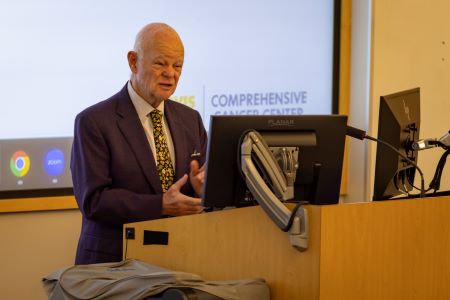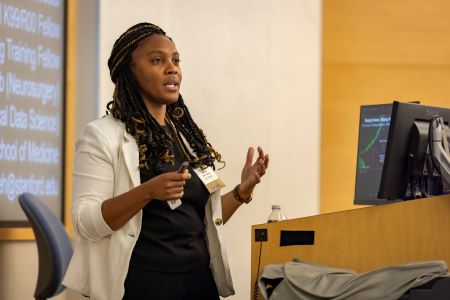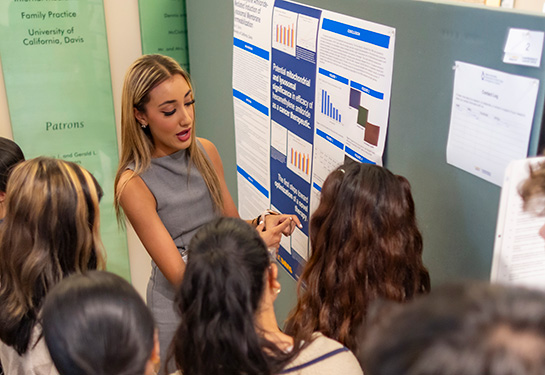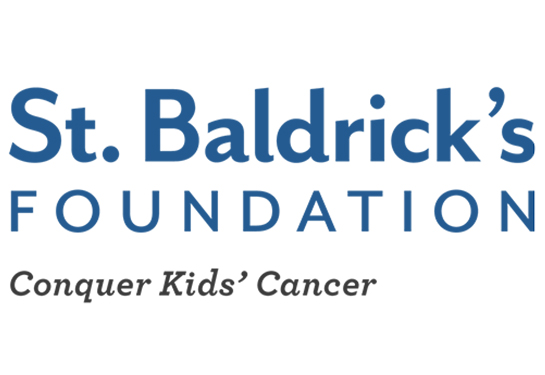Ralph de Vere White Symposium spotlights early-stage cancer researchers
The Ralph de Vere White Symposium for Early Stage Investigators in Cancer was held April 24 in the UC Davis Health Education Building.
The day-long annual event was hosted by UC Davis Comprehensive Cancer Center. It highlighted cancer research being conducted by undergraduates, predoctoral and postdoctoral students, research staff, residents and fellows.
“Events like these provide our junior colleagues and scholars with much-needed opportunities to hone their presentation and networking skills,” said cancer center Director Primo “Lucky” Lara Jr., who helped open the symposium.

The annual event was renamed last year in honor of Professor Emeritus Ralph de Vere White, former director of the cancer center. De Vere White was instrumental in obtaining the National Cancer Institute designation for UC Davis as a “comprehensive” cancer center.
Presenters
Janai Carr-Ascher, associate professor, Division of Hematology/Oncology, provided the welcome remarks. The keynote address was given by Maxine Umeh-Garcia, instructor of Neurosurgery at Stanford University School of Medicine, who will join the UC Davis faculty in the next academic year.
Umeh-Garcia shared her training and research journey. She told the audience of mainly students that success isn’t about where you start, but what you do to leverage opportunities, and how you position yourself to gain skills.

“Opportunities arise from anywhere and, even in high school, students should identify people who will be good mentors,” Umeh-Garcia said. “Knock on doors and you will find amazing people who are willing to help you.”
New this year, the symposium invited a local high school to attend. Coincidently, it was Sheldon High School, the same high school that Umeh-Garcia attended growing up in Sacramento.
Microbiology teacher Tabitha Lai brought 27 students to the symposium. The school will be participating in a new cancer center program in the fall designed to attract more students to biomedical research by expanding their confidence, knowledge, and skill in designing, executing, and communicating real scientific research while exploring pathways to college.
“The cancer center approached us with this opportunity due to our biomedical career technology track and we were excited to participate,” Lai said.
Winning research
Early-stage investigators showcase their research to experienced investigators, learn of potential research and collaborative opportunities, network and obtain career insights and gain a chance to win a prize for oral or poster presentations.
Criteria used to judge the presentations included scientific innovation, significance, and ultimate potential for clinical impact as well as scientific communication skills. Carr-Ascher , assistant director of the cancer center’s Office of Education, Training and Career Development, announced the best oral presenter and the best poster presenter. Each winner received a $500 cash award.
Oral presentation
Winner: Megan Purl, graduate student, Division of Surgical Oncology
Mentors: Surgical oncologists Sean Judge and Robert Canter
Title: “Targeting pancreatic cancer liver metastases using regional NK cellular therapy against B7-H3”
Poster presentation
Winner: Ivan Lu, graduate student, Department of Pathology and Laboratory Medicine
Mentor: Cancer center Chief Science Officer XJ Wang
Title: “Impacts of Elesclomol-induced Cuprotosis on the HNSCC Tumor Immune Microenvironment”
Roundtables
Nine roundtable discussions focusing on critical professional development topics ranging from building mentorship teams to best practices in grant writing, weighing career options. They were moderated by cancer center senior investigators, grant experts, and industry representatives. During one of the roundtable discussions, UC Davis undergraduate and medical students met with the Sheldon High School students.
Organizers
The symposium was organized by the Office of Education, Training and Career Development.
UC Davis Comprehensive Cancer Center
UC Davis Comprehensive Cancer Center is the only National Cancer Institute-designated center serving the Central Valley and inland Northern California, a region of more than 6 million people. Its specialists provide compassionate, comprehensive care for more than 100,000 adults and children every year and access to more than 200 active clinical trials at any given time. Its innovative research program engages more than 240 scientists at UC Davis who work collaboratively to advance discovery of new tools to diagnose and treat cancer. Patients have access to leading-edge care, including immunotherapy and other targeted treatments. Its Office of Community Outreach and Engagement addresses disparities in cancer outcomes across diverse populations, and the cancer center provides comprehensive education and workforce development programs for the next generation of clinicians and scientists. For more information, visit cancer.ucdavis.edu.




